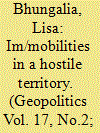| Srl | Item |
| 1 |
ID:
185081


|
|
|
|
|
| Summary/Abstract |
Taking the Capitol riots of January 6 as a point of departure, this article queries the utility of abject white violence to the US security state through a focus on the latest push for domestic terrorism legislation. Drawing on the first-ever National Strategy for Countering Domestic Terrorism released by the White House in June 2021, we trace how the US security state constructs white supremacist violence as both abject and anachronistic, a creative project of history-making through which the liberal security state operationalizes that violence to bolster and expand US empire and counterinsurgency. Further, we explore how the fungibility of abject whiteness within contemporary US counterterrorism creates a metonymic power by which the foreign and domestic cohere, collapse, and diverge through the figure of the racialized terrorist to suit the needs of the imperial state. While the state’s current push for domestic terrorism legislation publicly portrays a stance of historical reconciliation and multicultural protectionism, the figure of the domestic terrorist functions as a conduit through which the violence of the state is rerouted. Through this vision of besieged multiculturalism, the liberal security state seeks to creatively refashion US empire domestically and at the global scale.
|
|
|
|
|
|
|
|
|
|
|
|
|
|
|
|
| 2 |
ID:
113516


|
|
|
|
|
| Publication |
2012.
|
| Summary/Abstract |
This article examines the biopolitical dimensions of conflict manifest in Israel's disengagement from the Gaza Strip. Exploring a managed relation between life and death largely unaddressed in Foucault's conception of biopower, it contends that Israel's "disengagement" can be seen as a more sophisticated, flexible form of engagement that does not disinvest in or abandon life, but actively regulates it. Close analysis of emerging tactics of population control in Gaza illustrate that neither a "pure" politics of life or death emerges; rather, a more complex management of the two is achieved through the modulation of crucial life-sustaining and life-eliminating flows into and out of the territory. This paper links biopolitical practices of mobility regulation to the ways in which life is enabled, constrained and denied for those in a territory designated as "hostile." Thus, it directly connects the biopolitical dimensions of conflict to territory and the geopolitical violences of territoriality.
|
|
|
|
|
|
|
|
|
|
|
|
|
|
|
|